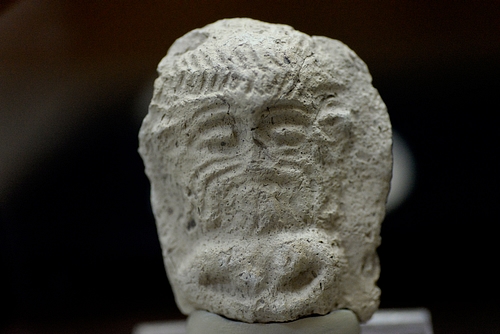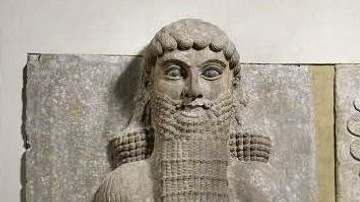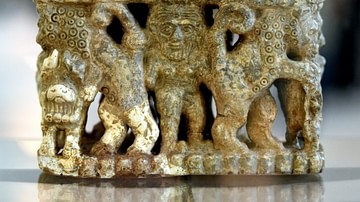Gilgamesh and Huwawa is a Sumerian poem relating the expedition of Gilgamesh and Enkidu to the Cedar Forest and the slaying of the monster-demon Huwawa. The work predates and informs The Epic of Gilgamesh in which the death of the monster leads to Enkidu's own as his actions are condemned by the gods.
The best-preserved copy dates from c. 1900-1600 BCE, though the poem is understood as much older and, as with most Mesopotamian literature, was passed down by oral tradition until preserved in written form. The piece was part of the curriculum of the edubba, the Sumerian scribal schools, and was the final composition students needed to master in the Decad (groups of ten works) before moving on to the even more difficult texts required for graduation.
The work was discovered in the ruins of the city of Nippur, Iraq, between 1888-1900 and, although frequently engaged with by scholars in its own right, is more often studied for its influence on The Epic of Gilgamesh. In this poem, it is Enkidu who slays the monster while, in The Epic of Gilgamesh, he encourages Gilgamesh to kill the monster-demon who is known there as Humbaba, 'demon' meaning 'supernatural entity', not 'evil spirit'. In the epic, Humbaba's death and Enkidu's later affront to the goddess Ishtar result in his death. In this earlier work, the gods condemn the killing and punish humanity by dispersing Huwawa's powerful auras/terrors to various locations, which then become threatening.
Summary
The poem opens with Gilgamesh announcing to Enkidu how he will set off for the mountains to do great deeds and make a name for himself that will live on after he dies. Enkidu suggests he ask permission from the sun god Utu as the Cedar Forest in the mountains is his domain. Utu grants permission and Gilgamesh recruits a contingent of 50 single men to help him (lines 1-60). It should be noted that Utu has only given them permission to go to the forest, not to molest or harm Huwawa in any way. Although they seem to be the heroes of the tale, they betray Utu's trust by attacking Huwawa, the guardian of the Cedar Forest appointed by the gods.
In lines 61-67, the group travels over six mountain ranges to the Cedar Forest and begins harvesting trees, but Huwawa "loosed his terrors" against them, and all fall into a deep sleep except for Enkidu. Lines 68-95 relate Enkidu's attempts to wake his master (in this poem, he is Gilgamesh's servant, not his best friend as in the epic), and when Gilgamesh comes to, he is outraged by the sleeping spell and wants to find the "human or god" responsible. Enkidu tries to talk him out of this, but he will not listen (lines 96-120), and they go and face Huwawa, who again casts spells at them and taunts them while Gilgamesh resists (lines 121-144).
Gilgamesh charms the beast by making him promises of gifts of friendship, drawing one aura/terror from him after another, as he slowly moves closer, and when he is in range, he punches the monster and ties him up (lines 145-152). Huwawa begs for mercy, and Gilgamesh is prepared to let him go, but Enkidu encourages his master to kill the beast, and after Huwawa berates him for cruelty and hateful words, he kills the monster-demon himself (lines 153-180).
Enkidu and Gilgamesh bring the head of Huwawa to Enlil, king of the gods, seeming to expect a reward, but are instead condemned for the killing, and Enlil takes Huwawa's auras/terrors from Gilgamesh and gives them to lions and to different places like rivers, forests, reed-beds – even the palace – where dangers will now lurk to plague humanity. The poem ends with praise for Gilgamesh and Enkidu for killing the monster (and so allowing people to cut the trees of the forest) and to the goddess of writing, Nisaba, who was traditionally mentioned at the completion of any written work.
The Text
The following excerpt is taken from The Literature of Ancient Sumer, translated by Jeremy Black et al., supplemented by the online Electronic Text Corpus of Sumerian Literature, which is the same translation. Ellipses indicate missing words or lines and question marks alternate translations of a word. Owing to considerations of space, the following begins at line 68 when Gilgamesh is put to sleep by Huwawa's spell.
68-75: Gilgamesh ... was overcome by sleep, and it affected Enkidu ... as a powerful longing. His fellow-citizens who had come with him flailed around at his feet like puppies. Enkidu awoke from his dream, shuddering from his sleep. He rubbed his eyes; there was eery silence everywhere. He touched Gilgamesh but could not rouse him. He spoke to him, but he did not reply.
76-84: "You who have gone to sleep, you who have gone to sleep! Gilgamesh, young lord of Kulaba, how long will you sleep for? The mountains are becoming indistinct as the shadows fall across them; the evening twilight lies over them. Proud Utu is already on his way to the bosom of his mother Ningal. Gilgamesh, how long will you sleep for? The sons of your city who came with you should not have to wait at the foot of the hills. Their own mothers should not have to twine string in the square of your city."
85-89: He thrust that into his right ear; he covered him with his aggressive words as if with a cloth. He gathered in his hand a cloth with thirty shekels of oil on it and smothered it over Gilgamesh's chest. Then Gilgamesh stood up like a bull on the great earth. Bending his neck downwards, he yelled at him:
90-91: "By the life of my own mother Ninsun and of my father, holy Lugalbanda! Am I to become again as if I were slumbering still on the lap of my own mother Ninsun?"
92-95: A second time he spoke to him: "By the life of my own mother Ninsun and of my father, holy Lugalbanda! Until I discover whether that person was a human or a god, I shall not direct back to the city my steps which I have directed to the mountains."
96-97: The slave, trying to ameliorate the situation, trying to make life appear more attractive, answered his master:
98-106: "My master, you have not yet really seen that person, he should not vex you. – But he vexes me – me, who have seen him before. His pugnacious mouth is a dragon's maw; his face is a lion's grimace. His chest is like a raging flood; no one dare approach his brow, which devours the reed-beds. A man-eating lion, he never wipes away the blood from his slaver.
1 line fragmentary
... a lion eating a corpse, he never wipes away the blood
3 lines fragmentary
Travel on, my master, up into the mountains! – but I shall travel back to the city. If I say to your mother about you "He is alive!", she will laugh. But afterwards I shall say to her about you "He is dead!", and she will certainly weep over you bitterly."107-116: "Look, Enkidu, two people together will not perish! A grappling-pole does not sink! No one can cut through a three-ply cloth! Water cannot wash someone away from a wall! Fire in a reed house cannot be extinguished! You help me, and I will help you – what can anyone do against us then? When it sank, when it sank, when the Magan boat sank, when the magilum barge sank, then at least the life-saving grappling-pole of the boat was rescued ! Come on, let's get after him and get a sight of him!"
117-119: "If we go after him, there will be terror! There will be terror. Turn back! Is it advisable? Is it advisable? Turn back!"
120: "Whatever you may think – come on, let's get after him!"
121-125: Before a man can approach within even sixty times six yards, Huwawa has already reached his house among the cedars. When he looks at someone, it is the look of death. When he shakes his head at someone, it is a gesture full of reproach. When he speaks to someone, he certainly does not prolong his words: "You may still be a young man, but you will never again return to the city of your mother who bore you!"
126-129: Fear and terror spread through Gilgamesh's sinews and his feet. He could not move (?) his feet on the ground; the big toenails of his feet stuck ... to the path (?). At his side ...
130-135: Huwawa addressed Gilgamesh: "So come on now, you heroic bearer of a sceptre of wide-ranging power! Noble glory of the gods, angry bull standing ready for a fight! Your mother knew well how to bear sons, and your nurse knew well how to nourish children on the breast! Don't be afraid, rest your hand on the ground!"
136-139: Gilgamesh rested his hand on the ground and addressed Huwawa: "By the life of my own mother Ninsun and of my father, holy Lugalbanda! No one really knows where in the mountains you live; they would like to know where in the mountains you live. Here, I have brought you En-me-barage-si, my big sister, to be your wife in the mountains."
140-144: And again, he addressed him: "By the life of my mother Ninsun and of my father, holy Lugalbanda! No one really knows where in the mountains you live; they would like to know where in the mountains you live. Here, I have brought you Ma-tur, my little sister, to be your concubine in the mountains. Just hand over your terrors to me! I want to become your kinsman!"
145-148: Then Huwawa handed over to him his first terror. Gilgamesh's fellow-citizens who had come with him began to lop off the branches and bundle them together, so as to lay them down at the foot of the hills.
(Several mss. preserve a more elaborate, but repetitive narrative built on the pattern of lines 145-148):
And again, he addressed him: "By the life of my mother Ninsun and of my father, holy Lugalbanda! No one really knows where in the mountains you live; they would like to know where in the mountains you live. Here, I have brought to the mountains for you ... Couldn't I get close to you and your family? Just hand over your terrors to me! I want to become your kinsman!" Then Huwawa handed over to him his second terror. Gilgamesh's fellow-citizens who had come with him began to lop off the branches and bundle them together, so as to lay them down at the foot of the hills.
And a third time he addressed him: "By the life of my mother Ninsun and of my father, holy Lugalbanda! No one really knows where in the mountains you live; they would like to know where in the mountains you live. Here, I have brought to the mountains for you some eca flour – the food of the gods! – and a waterskin of cool water. Couldn't I get close to you and your family? Just hand over your terrors to me! I want to become your kinsman!" Then Huwawa handed over to him his third terror. Gilgamesh's fellow-citizens who had come with him began to lop off the branches and bundle them together, so as to lay them down at the foot of the hills.
And a fourth time he addressed him: "By the life of my mother Ninsun and of my father, holy Lugalbanda! No one really knows where in the mountains you live; they would like to know where in the mountains you live. Here, I have brought to the mountains for you some big shoes for big feet. Couldn't I get close to you and your family? Just hand over your terrors to me! I want to become your kinsman!" Then Huwawa handed over to him his fourth terror. Gilgamesh's fellow-citizens who had come with him began to lop off the branches and bundle them together, so as to lay them down at the foot of the hills.
And a fifth time he addressed him: "By the life of my mother Ninsun and of my father, holy Lugalbanda! No one really knows where in the mountains you live; they would like to know where in the mountains you live. Here, I have brought to the mountains for you some tiny shoes for your tiny feet. Couldn't I get close to you and your family? Just hand over your terrors to me! I want to become your kinsman!" Then Huwawa handed over to him his fifth terror. Gilgamesh's fellow-citizens who had come with him began to lop off the branches and bundle them together, so as to lay them down at the foot of the hills.
And a sixth time he addressed him: "By the life of my mother Ninsun and of my father, holy Lugalbanda! No one really knows where in the mountains you live; they would like to know where in the mountains you live. Here, I have brought you rock-crystal, nir stone and lapis lazuli – from the mountains. Couldn't I get close to you and your family? Just hand over your terrors to me! I want to become your kinsman!" Then Huwawa handed over to him his sixth terror. Gilgamesh's fellow-citizens who had come with him began to lop off the branches and bundle them together, so as to lay them down at the foot of the hills.
149-151: When Huwawa had finally handed over to him his seventh terror, Gilgamesh found himself beside Huwawa. He went up to him gradually from behind, as one does with a ... snake. He made as if to kiss him, but then punched him on the cheek with his fist.
152: Huwawa bared his teeth at him. Huwawa addressed Gilgamesh: "Hero, ... to act falsely!" The two of them ... on him ... ... the warrior from his dwelling. ... said to him, "Sit down!" ... Huwawa from his dwelling. ... said to him, "Sit down!" The warrior sat down and began to weep, shedding tears. Huwawa sat down and began to weep, shedding tears. Huwawa ... plea ... to Gilgamesh. He threw a halter over him as over a captured wild bull. He tied up his arms like a captured man. Huwawa wept, ...
153-157: He tugged at Gilgamesh's hand. "Gilgamesh, let me go! I want to talk to Utu! Utu, I never knew a mother who bore me, nor a father who brought me up! I was born in the mountains – you brought me up! Yet Gilgamesh swore to me by heaven, by earth, and by the mountains."
158-160: Huwawa clutched at Gilgamesh's hand and prostrated himself before him. Then Gilgamesh's noble heart took pity on him. Gilgamesh addressed Enkidu:
161-162: "Enkidu, let the captured bird run away home! Let the captured man return to his mother's embrace!"
163-174: Enkidu replied to Gilgamesh: "Come on now, you heroic bearer of a sceptre of wide-ranging power! Noble glory of the gods, angry bull standing ready for a fight! Young lord Gilgamesh, cherished in Uruk, your mother knew well how to bear sons, and your nurse knew well how to nourish children! – One so exalted and yet so lacking in understanding will be devoured by fate without him ever understanding that fate. The very idea that a captured bird should run away home, or a captured man should return to his mother's embrace! – Then you yourself would never get back to the mother-city that bore you! A captured warrior set free! A captured high priestess ... to the gipar! A captured gudu priest restored to his wig of hair! ... ever, ever ...?"... his attention to his words ...
175-177: Huwawa addressed Enkidu: "Enkidu, you speak such hateful ... you speak such hateful words to him. Why do you speak such hateful words to him?"
178-180: As Huwawa spoke thus to him, Enkidu, full of rage and anger, cut his throat. He put…He chucked…They put his head in a leather bag.
181-186: They entered before Enlil. After they had kissed the ground before Enlil, they threw the leather bag down, tipped out his head, and placed it before Enlil. When Enlil saw the head of Huwawa, he spoke angrily to Gilgamesh. They brought it before Enlil and Ninlil. When Enlil approached (?), ... went out the window (?), and Ninlil went out ... When Enlil with Ninlil had returned ... (?)
187-192: "Why did you act in this way? ... did you act ...? Was it commanded that his name should be wiped from the earth? He should have sat before you! He should have eaten the bread that you eat, and should have drunk the water that you drink! He should have been honoured ... you!" From his seat, Enlil assigned Huwawa's heavenly auras to ...)
193-200: (the ms. tradition for these lines is extremely confused about the order in which the various auras are assigned; the following sequence is a compromise:) He gave Huwawa's first aura to the fields. He gave his second aura to the rivers. He gave his third aura to the reed-beds. He gave his fourth aura to the lions. He gave his fifth aura to the palace. He gave his sixth aura to the forests. He gave his seventh aura to Nungal (the goddess of prisoners) ... his terror ... the rest of the auras ... Gilgamesh...)
201-202: Mighty one, Gilgamesh, who is cherished! Nisaba, be praised! Huwawa, ...! ... cherished, ...! Praise be to Enkidu ...!'






